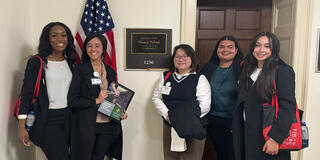SONHP Students Represent USF at the AACN Student Policy Summit

Five USF students traveled to Washington, D.C., to visit with federal policymakers and attend the AACN Student Policy Summit. Djosy Charles reflects on her experience.
With the support of the USF School of Nursing and Health Professions and Dean Eileen Fry-Bowers, as well as the invaluable guidance of past USF attendees, I, alongside four of my peers, had the honor of representing USF at the 2024 AACN Student Policy Summit. This two-day conference held in the heart of Washington, D.C., provided nursing students from all corners of the nation an in-depth exploration of the intricacies of the federal policy process and emphasized the impact and transformative power of advocacy. This experience served as a catalyst for me to wholeheartedly embrace my role as a professional advocate and instilled in me a dedication not only to the care and health of my future patients, but also to recognize and actively engage in the broader discourse surrounding the nation's health.
Throughout the summit, amidst various didactic program sessions, I found myself not only networking with esteemed nursing professionals and students but also diving deep into the true essence of my advocacy role. We explored different avenues in which we could effect change in the nursing profession, whether through groundbreaking research through the National Institute of Nursing Research (NINR) or by active involvement in the local and national political spheres. We were provided with tools and resources to advocate for issues that truly mattered to us as nursing students, our patients, and our respective communities.
Through a session facilitated by the NINR Deputy Director, Dr. Courtney Ferrell Aklin, we gained a comprehensive understanding of the collaborative dynamics within the nursing research community and learned how various stakeholders, including the National Institutes of Health, the federal government, and other organizations, synergistically work together to strengthen the nursing workforce and drive transformative change for patients.
We also visited the offices of influential figures such as Representatives Nancy Pelosi and Nancy Eshoo, and had the privilege of conversing with the staffers of Senator Laphonza Butler and Representative Julia Brownley, which further enriched our understanding of the legislative landscape. During these conversations, we had the opportunity to advocate for the Title VIII Nursing Workforce Development Programs to address all aspects of the nursing workforce, including but not limited to education, scope of practice, recruitment, and retention. We skillfully leveraged our experiences as nursing students to champion various initiatives, including advocating for expanded nursing education opportunities for students from disadvantaged backgrounds, increased funding for post-doctoral nursing students and the NINR, and increased avenues for facilitating career advancement within the nursing profession.
Former Congressman Alan Wheat led one notably poignant session during the summit. Congressman Wheat eloquently summarized the profound impact of human connection, particularly emphasizing the power of touch in both politics and community engagement. This session resonated deeply, reminding me of the human-centric essence of our advocacy endeavors and reaffirming the main reason behind my dedication to the nursing profession: to heal, to empower, and to provide opportunities for individuals to engage with their health and well-being actively.
The 2024 AACN Student Policy Summit fortified my commitment to advocacy. It equipped me with the tools and insight needed to effect positive and lasting change within the nursing profession and in the lives of my future patients. Attending the conference strongly underscored the significance of my voice within the political arena. It illuminated the critical importance of a unified voice within the nursing profession to propel our nation's health forward. As nursing students and future health professionals, our advocacy roles must transcend beyond the confines of clinical settings. Policies serve as the bedrock upon which the rights, agency, and health of our patients’ rest. Therefore, we must make it our responsibility as future nursing professionals to actively participate in shaping policies that safeguard the integrity of the nursing profession and enhance the fundamental elements of patient care and well-being.


